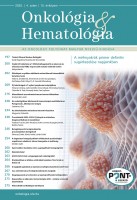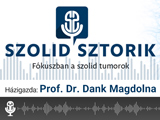Keresés eredménye
Az emlőrák korszerű sebészete
Ilyen még nem volt!
Az emlő daganata a leggyakoribb női rosszindulatú elváltozás, ezért gyógyítására nagy hangsúlyt kell fektetni. Nemrég jelent meg „Az emlőrák korszerű sebészete” című szakkönyv, amelynek szerkesztőivel, Kásler Miklós professzor úrral és Mátrai Zoltán tanár úrral beszélgettünk. Magyar nyelven egészen mostanáig egyetlen hasonló művet sem adtak ki, ezért is forradalmi alkotás ez a könyv. ...
Kreditpontszerzés 6/6 - A kardiotoxicitás szerepe a kemoterápiában
A 6 részes továbbképző tanfolyamunk során Dr. Nagy András Csaba, az Uzsoki Utcai Kórház I. Belgyógyászati Osztályának főorvosa kalauzolja el Önöket a kemoterápia kardiális szövődményeinek prevenciójába, diagnosztikájába és menedzselésébe. Megismerheti az egyes daganatellenes szerekre típusos kardiális szövődményeket, a hospitalizált betegek thromboprofilaxisának és az ischaemiás szívbetegek kettős thromocyta-...
Aktualitások az onkológiában
Mikor kerülhet sor Magyarországon az első tüdőtranszplantációra? Hogyan működik a napi gyakorlatban a „14 napos szabály”? Milyen változások bevezetése szükséges az onkológiai betegellátás javítása érdekében? Ezekre a kérdésekre ad választ interjúnkban Kásler Miklós professzor úr, a Magyar Onkológus Társaság kongresszusának fővédnöke....
Az együttműködés alapvető
Dr. Mangel László a Magyar Onkológusok Társaságának soron következő elnöke. Vele készített interjúnkban az ezzel kapcsolatos jövőbeni terveiről kérdeztük. Kiemelte, hogy az együttműködés a különböző szakágak között alapvető jelentőségű, és a nemrég megjelent új ágazat, az immunonkológia is szerepet kell, hogy kapjon a társaság munkájában....
Ne lődözzünk vaktában!
A daganatok diagnosztikájában, kezelésük folyamán és az eredmények értékelése során elengedhetetlen, hogy minél pontosabb információt nyerjünk a tumor méretéről, elhelyezkedéséről, az esetleges metasztázisokról. Az onkológus kelléktárában ma már rendelkezésre álló PET/CT mindezekben nagy segítség lehet. Ennek aspektusairól kérdeztük interjúnkban Dr. Lövey Józsefet....
Új terápiás lehetőségek melanomában
A melanoma immunogén daganat lévén úgy tűnik, jó eredménnyel kezelhető immunterápiával. A checkpoint inhibitorok használata esetén kedvezőek a túlélési mutatók és az új szereknek már a tolerálhatósága is lényegesen jobb. A célzott terápia szintén kiváló kezelési lehetőséget biztosít megfelelő indikációban alkalmazva. A bőronkológia szakértője, Liszkay Gabriella professzor asszony osztotta meg velünk ...
Miért volt érdemes ellátogatni a MOT kongresszusára
Dr. Géczi Lajost, a Magyar Onkológus Társaság elnökét a társaság XXXI. kongresszusáról kérdeztük. Vele készült interjúnkból megtudhatják, hogy mik voltak saját tapasztalatai, az esemény sarkalatos pontjai, és az onkológia terén napvilágot látott legfontosabb újdonságok....
Tumorkövetés vérminta alapján
Kutatók kimutatták, hogy a tumor-DNS véráramba kerülése után annak segítségével lehetővé válik a rák valós idejű követése, fejlődése, terápiára adott válasza, derült ki a Nature Communicationsben megjelent új Cancer Research UK tanulmányból. ...
Az FDA új indikációban fogadta be az ipilimumabot
Kreditpontszerzés 6/6 - A kardiotoxicitás szerepe a kemoterápiában
Irányelvek és regiszterek a daganatellenes szerek kardiotoxicitására vonatkozóan
Az ESMO guideline a reverzibilis és irreverzibilis károsodást okozó felosztás mellett a szövődmények szerint (balkamra-diszfunkció, ischaemia, hipertónia, QTc megnyúlás) csoportosítja a kemoterápiás szereket. Milyen vizsgálatokat kötelező/ajánlott elvégezni kemoterápia előtt, alatt és után? Mitől függ a radioterápia okozta ...
Új biológiai ágensek a non-Hodgkin- lymphoma és a krónikus lymphocytás leukémia kezelésében
Általánosságban elmondható, hogy a non-Hodgkin-lymphoma incidenciája növekszik. Az agresszív non-Hodgkin-lymphomák – mint amilyen a diffúz nagy B-sejtes lymphoma – első vonalbeli kezelése kuratív szándékkal történik, azonban az indolens kórképek – mint például a krónikus lymphocytás leukémia/kis lymphocytás lymphoma általában nem tartozik a gyógyítható betegségek közé. Ezen felül a relapszust ...
Az agyi metasztázisok jelenlegi és új kezelési módozatai
A rosszindulatú daganatban szenvedő betegek agyi áttétei a betegség több szervre való terjedését jelezhetik, vagy neurológiai károsodáshoz vezethetnek, amennyiben helyileg kezeletlenek maradnak, továbbá kedvezőtlen túléléssel és magas morbiditással társulnak. Összehasonlítva a szervezet egyéb területein kialakuló áttétekkel, az agyi metasztázisok egyedülálló biológiai tulajdonságokkal rendelkeznek, amelyek ...
Kreditpontszerzés 5/6 - A kardiotoxicitás szerepe a kemoterápiában
ISZB és tumoros betegségek
A tumoros betegségek és az ISZB együttes előfordulása gyakori: az ISZB lehet kardiotoxicitás következménye, a már meglévő ISZB pedig kontraindikálhatja a kemoterápiás kezelést. Hatrészes továbbképző tanfolyamunk ötödik előadásában a tumorműtétet megelőző revaszkularizáció (egyszerű fémstentek vs. gyógyszerkibocsájtó stentek) és a kettős thrombocyta-aggregáció gátló ...
Remény kissejtes tüdőrákban
A kissejtes tüdőrák az egyik legagresszívabb daganat, amelynek kezelésében jelenleg sajnos igen limitált lehetőségeink vannak. Ezért is nagyon reménykeltő az a Rova-T elnevezésű célzott terápia (egy a DLL-3 fehérjéhez kötődő konjugátum), amelynek fázis I-es vizsgálatában a szert másod- vagy harmadvonalban kapó DLL3-pozitív betegek teljes válaszadási aránya 45% volt. Interjúnkban Catherine Pietanzát kérdeztük az ...
Az acetilszalicilsav kedvező hatása GI tumorokban
Holland kutatók retrospektív elemzés során azt figyelték meg, hogy a gasztrointesztinális tumorban szenvedő és a diagnózis után acetilszalicilsavat szedő betegek túlélése jelentősen jobb a gyógyszert nem szedőkénél. Az eredmények részleteiről, a folyamatban lévő randomizált kontrollált vizsgálatokról, a thrombocyta-aggregáció gátlás feltételezett tumorellenes mechanizmusáról és a várható terápiás ...
A terhesség alatti kemoterápia hatása a magzatra
Terhesség alatt az esetek fél-egy ezrelékében diagnosztizálnak valamilyen rosszindulatú folyamatot, leggyakrabban emlő-, cervixkarcinómát vagy akut leukémiát. Frederic Amant és munkatársai 129 olyan kisgyermeket vizsgáltak meg, akik édesanyja kemo-/radioterápiában részesült a terhesség alatt. Az eredményeknek fontos üzenete van a választandó terápiás stratégiát illetően. Tekintse meg videó interjúnkat!...
Jobb túlélési esélyek műtéti terápia alkalmazása esetén a garat daganataiban
A szájgarat és gégegarat rákos megbetegedéseiben magasabb lehet a túlélési arány, ha a korai kezelés során műtétre is sor kerül, derült ki a 2015. évi European Cancer Congressen a Chih-Tao Cheng által vezetett és bemutatott vizsgálatból. ...
Veserákban is eredményes az immunterápia – Eredmények a CheckMate 025 vizsgálatából
Az első kezelést követően progressziót mutató, előrehaladott, világossejtes veserákban a nivolumab növeli a túlélést, ez derült ki a 2015. évi European Cancer Congressen Padmanee Sharma által ismertetett CheckMate025 vizsgálatból....
Kreditpontszerzés 4/6 - A kardiotoxicitás szerepe a kemoterápiában
Mélyvénás thrombosis és pulmonális embólia daganatos betegekben
A daganatos betegekben kialakuló prothrombotikus vagy hiperkoagulációs állapot gyakran vezet thrombotikus szövődmények kialakulásához. A sebészi és gyógyszeres terápia tovább fokozza ennek rizikóját, ezért a hospitalizált betegeket profilaxisban kell részesíteni. Ennek mikéntjéről és dilemmát okozó kérdéseiről (kezelés optimális időtartama, ...
Merre tart a célzott és az immunterápia?
Az immunterápia első eredményeit a kifejezetten immunogén természetű melanomában ismerhettük meg, „az igazi meglepetés azonban az volt, hogy nem kissejtes tüdőrákban is működik, holott azt nem tartottuk immunogén daganatnak” – mondta el interjúnkban Christoph Zielinski professzor, akit az immunterápia eredményeiről és jövőjéről, illetve, mint a terület szakértőjét, az emlőrák célzott kezelésének ...






